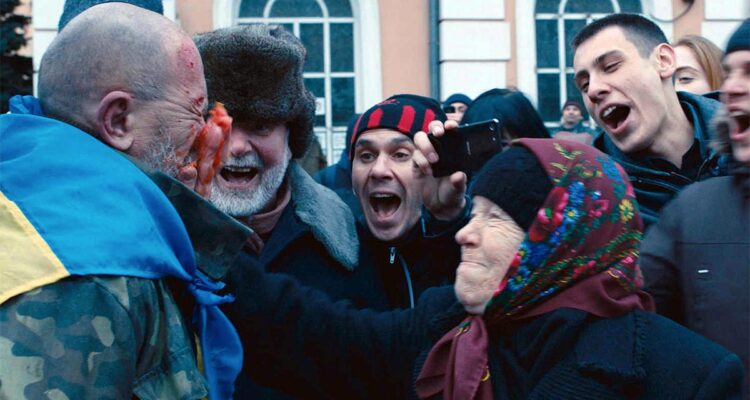Nobody who knows anything about war would claim there are good or bad conflicts. Still, the warfare seen in Sergey Loznitsa’s savage Ukraine-set satire “Donbass” manages to seem even more harrowing than the fictional fighting we are used to seeing on screen. That is not because the film is gruesome in its visuals. Instead, Loznitsa shows us something potentially more frightening than a bloody drag-out battle between two armies: A war where one side is barely recognizable from the other, the stakes are hard to discern, and because it is not quite clear what the fighting is for, it is difficult to imagine it ending.
Winner of the 2018 Un Certain Regard award for Best Director at the 2018 Cannes Film Festival but only getting released in the United States now, “Donbass” makes for eerie viewing coming just weeks after the Russo-Ukrainian war entered a new phase following the Russian invasion of late February 2022. Set at some unspecified time after Russian-backed separatists carved off the Donbass region of southeast Ukraine in early 2014, the film provides a glimpse of what life is like in (as the on-screen titles term it) “Occupied Territory in Eastern Ukraine.” From what we see here, day-to-day life appears to be some combination of Cossack ”Mad Max” cosplay, throwback Soviet-era corruption, smashmouth nationalism, and gangster’s paradise.
The film pulls together a dozen or so chaotic vignettes linked by a thin thread of tangential connections, not unlike an especially formless late Robert Altman film without celebrity cameos. Loznitsa reportedly based each vignette at least somewhat on real stories that happened in the Donbass region. The director is primarily a documentarian (“State Funeral”, which though strictly historical, shares with this film a macabre sense of humor), and that training shows. “Donbass” is a film that knows how to showcase setting and details more than create characters or drama. This is not necessarily a criticism, though woe betide anyone watching this movie after hearing that it was a comedy and hoping for some laughs. “Donbass” is a comedy in the sense that the absurdist plays of Eugene Ionesco are comedies.
Some of the stories do not seem at first particularly dramatic: A bus filled with civilians returning from unoccupied Ukraine registering their woes with grim stoicism (“I’m going back and don’t know if there’s anything left of my house”); a man giving a tour of a bomb shelter filled with grim-faced survivors; a German reporter interviewing soldiers too busy joking around to talk. But each comes with a twist: All the men on the bus are shanghaied into the separatist army; the shelter turns out to be filled with people who prefer living there because they want nothing to do with the pro-Russian gangsters running life aboveground; when one band of soldiers laughingly obfuscates where they are from to the reporter, it’s clear they are meant to be the “little green men” (Russian soldiers semi-secretly sent to fight in Donbass without official markings on their uniforms).
Other episodes take different tacks. An especially grim one follows a captured Ukrainian soldier paraded through a Donbass town and being treated to multiple varieties of abuse. Hooting young men beat on him for kicks while filming it on their phones while old woman attack him as a proxy for everything and everyone they have lost in the war. In one of the more seemingly comedic sections, a raucous wedding keeps turning into a drunken nationalist rally. Loznitsa’s control of the material is not always assured in the episodes that aim for humor. One vignette has a corrupt official showing off to a hospital’s down-beaten staff all the donated goods they were supposedly getting (“I ordered the militia not to loot”). The scene might be illustrative but it’s repetitive and telegraphs the punch line.
More eerie and ultimately memorable are the less explicable sections that underline the fog of disinformation and criminal savagery shown here as endemic. One scene neatly illustrates the corruption of language by having a man whose car has just been stolen by the separatist military get berated by an officer who asks whether he would prefer they fight on bicycles: “it’s not robbery, it’s expropriation.” A pair of framing episodes about a production crew who may be part of a film within a film straddles the line between surreality and propaganda satire in an unsettling, did-that-happen? manner.
Although technically a war film, “Donbass” shows relatively little of the war, and is better for it. Most of the actual violence takes place just slightly out of sight and is only viewed in the aftermath. Its war is one of stalemate, checkpoints manned by bored soldiers, random artillery barrages, sudden nighttime ambushes where it is hard to tell who is who, and a separatist “army” that appears to be little more than a criminal gang in camouflage. The prevailing mood is one of chaos, bafflement, and a blithe inhumanity drenched in punch-drunk patriotism. While “Donbass” is far from perfect, hiding too much of its story and message in at-times dull and layered absurdity, it nevertheless presents a harrowing picture of how war and nationalism corrupt and degrade places nowhere near the battlefield. [B]

